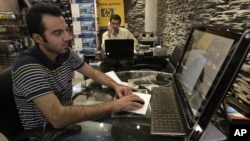In the run-up to Iran’s presidential election on June 14th, the Iranian regime has stepped up its campaign against free expression in Iran. In addition to arresting journalists, the government has taken steps to cut off internet access – preventing Iranian citizens from making informed choices about the election.
On May 30th, to help the Iranian people exercise their right to free expression and communicate more easily with one another, the U.S. Department of Treasury in coordination with the Department of State has issued a General License authorizing the exportation to Iran of certain services, software and hardware used for personal communications.
In a press release, State Department Spokesperson Jen Psaki said, “This license allows U.S. persons to provide the Iranian people with safer, more sophisticated personal communications equipment to communicate with each other and with the outside world. [It] aims to empower the Iranian people as their government intensifies its efforts to stifle their access to information.” Export of any equipment to the Iranian government or to any individual or entity on the Specially Designated Nationals list is not authorized.
Also on May 30, the Treasury Department designated Asghar Mir-Hejazi, as well as several entities in Iran, for contributing to serious human rights abuses, including through the use of communications technology to silence and intimidate the Iranian people. Ms. Psaki said Mir-Hejazi “has used his influence behind the scenes to empower elements from Iran’s intelligence services in carrying out violent crackdowns against the Iranian people.”
Among the entities designated by Treasury is the Committee to Determine Instances of Criminal Content (CDICC), the government body charged with filtering the flow of information to the Iranian people. In February 2013, the CDICC assembled a list of so-called cybercrimes related to the upcoming presidential election -- including such vaguely worded offenses as “disturbing the public and creating conflict in society,” or “publishing insulting content about the election and candidates.”
In another move, the State Department imposed visa restrictions on nearly 60 Iranian officials and other individuals who participated in the commission of human rights abuses in Iran.
State Department Spokesperson Psaki said, “As the Iranian government attempts to silence its people by cutting off their communication with each other and the rest of the world, the United States will continue to take action to help the Iranian people exercise their universal human rights, including the right to freedom of expression.”
On May 30th, to help the Iranian people exercise their right to free expression and communicate more easily with one another, the U.S. Department of Treasury in coordination with the Department of State has issued a General License authorizing the exportation to Iran of certain services, software and hardware used for personal communications.
In a press release, State Department Spokesperson Jen Psaki said, “This license allows U.S. persons to provide the Iranian people with safer, more sophisticated personal communications equipment to communicate with each other and with the outside world. [It] aims to empower the Iranian people as their government intensifies its efforts to stifle their access to information.” Export of any equipment to the Iranian government or to any individual or entity on the Specially Designated Nationals list is not authorized.
Also on May 30, the Treasury Department designated Asghar Mir-Hejazi, as well as several entities in Iran, for contributing to serious human rights abuses, including through the use of communications technology to silence and intimidate the Iranian people. Ms. Psaki said Mir-Hejazi “has used his influence behind the scenes to empower elements from Iran’s intelligence services in carrying out violent crackdowns against the Iranian people.”
Among the entities designated by Treasury is the Committee to Determine Instances of Criminal Content (CDICC), the government body charged with filtering the flow of information to the Iranian people. In February 2013, the CDICC assembled a list of so-called cybercrimes related to the upcoming presidential election -- including such vaguely worded offenses as “disturbing the public and creating conflict in society,” or “publishing insulting content about the election and candidates.”
In another move, the State Department imposed visa restrictions on nearly 60 Iranian officials and other individuals who participated in the commission of human rights abuses in Iran.
State Department Spokesperson Psaki said, “As the Iranian government attempts to silence its people by cutting off their communication with each other and the rest of the world, the United States will continue to take action to help the Iranian people exercise their universal human rights, including the right to freedom of expression.”






